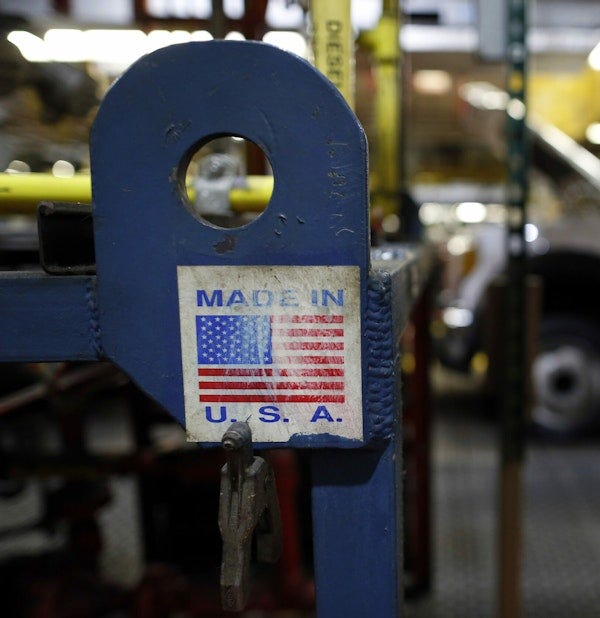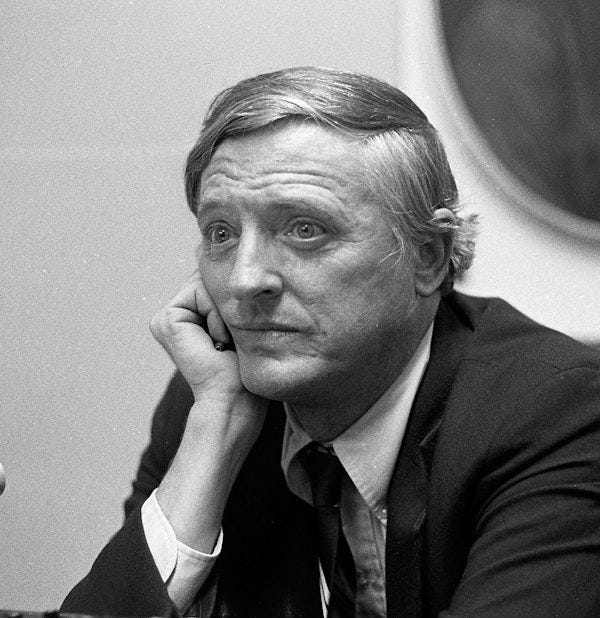The Future of Conservatism
Modern conservatism must explain what it’s for – and not just what it opposes.
Below is my latest essay for the George Bush Institute’s quarterly journal, The Catalyst. If you like what you read, please forward to your friends to subscribe.
A choice, not an echo
By Abby McCloskey
Spring 2025
I worry that my children may never get to experience true conservatism manifested in one of America’s major political parties – at least not like I did growing up. They may never feel the thrill I got from watching as an ideology that I believed was good and true was promoted by admirable institutions and leaders. Of course, they’ll be able to read about such moments in history books. But it may all seem so distant to them, so quaint.
Perhaps, while doing research for a university term paper, they’ll come upon the work of Phyllis Schlafly, who may as well have been Mother Mary in the Protestant Republican household of my childhood (at least to my father). I hope they do, because the title (more than the substance) of Schlafly’s infamous book, A Choice Not an Echo, frames much of what’s gone wrong with U.S. politics today.
The conservatism I knew growing up was a choice – a choice to adhere to longstanding principles and ideas, to hold onto a cord that stretched back to our nation’s founding. What I see in the Republican Party today is something very different: an echo, a reaction that defines itself largely in relation to something else.
Ask what Republicans stand for these days, and you’ll hear a lot about the things they are against: affirmative action, the deep state, international treaties and alliances, abortion on demand, free trade, the legacy media, open borders, the swamp, college protesters, boys in girls’ sports, or America being taken advantage of.
Now, there’s nothing wrong with being against things. I’m against unsustainable budget deficits and co-opting women’s sports and needless war. And today’s Republicans clearly do stand for certain things, such as “Made in America” and safe borders.
But I would argue that the modern GOP has become too focused on opposition to the way things are going – politically, economically, and culturally. These days, the Right’s policy solutions often feel like a call-and-response with the Left, and both sides’ solutions seem to have a similar substance and weight. Many contemporary Republicans exhibit a newfound comfort with expanded executive control and weakened norms, institutions, and constitutional guardrails – the kind of attitudes for which earlier conservatives would have criticized progressives. Too many Republicans now share a disregard for prudence and moderation and a predilection for rapid action. They eschew the tradition of civility and increasingly focus on an identity based on race, gender, and religion. Both the Left’s advocates of DEI, which stands for diversity, equity, and inclusion, and the White manosphere bros on the Right are obsessed with identity. Both the Left and the Right seem committed to escalation.
For those of us old enough to remember the old days – by which I mean those of us barely middle-aged – today’s politics often feel like an echo chamber. Sometime in the early 21st century, we became so divided that our political extremes started to resemble one another, at least in terms of methods and emotional intensity. Republicans and Democrats currently struggle to define themselves in the absence of the other.
Of course, one could argue that modern U.S. politics merely represent a return to the way things have usually been in this country. Much of the Republican Party’s past was not conservative – it was protectionist, nationalist, and incendiary. The temptation toward reactionary politics grows whenever a country becomes more anxious and uncertain, and we’re hardly in a period of certainty today.
Inside a Ford factory in Louisville, KY on Sept. 30, 2016. (Luke Sharrett / Bloomberg via Getty Images)
The problem with conservatism being pushed aside for reactionary politics is that the latter is fleeting and of the moment and ignores the threads connecting us with generations before and after. I think that’s why our political debates feel so vapid and transient – because echoes always are.
Conservatism gives roots and anchors a nation within its past and future, creating what Edmund Burke, the father of conservatism, called, “a condition of unchangeable constancy, through the varied tenure of perpetual decay, fall, renovation, and progression.” That condition is a precious gift in unnerving times – especially in unnerving times.
Remembrance of things past
What is this conservatism that’s been lost? When I tell my children about the conservatism I experienced coming of age in the 1990s and the early 2000s, I’ll describe it like this: More than anything else, the conservatism I knew was about humility, which couldn’t feel more alien to our current political life.
When I was growing up, conservatism was about the humility to believe that we don’t have all the answers, that we have much to learn from each other and those who came before us. Humility made us wary of concentrated power and of moving too quickly. It reminded us that building institutions is harder than breaking them.
Now, the humility of conservatism didn’t mean one should be an empty sponge, soaking up everyone else’s opinions because you have none of your own. Nor does conservatism mean that things should always stay the same.
But it does mean that one’s guiding principles should be drawn from deep-rooted and time-tested institutions and beliefs, not the whipping winds and gut reactions of the political moment.
But it does mean that one’s guiding principles should be drawn from deep-rooted and time-tested institutions and beliefs, not the whipping winds and gut reactions of the political moment. The humble conservatives of my youth recognized that our actions have unintended consequences and that because the world is enchanted in many ways, we should tread lightly. As the political theorist Hannah Arendt wrote, “the old virtue of moderation, of keeping within bounds, is indeed one of the political virtues par excellence, just as the political temptation par excellence is indeed hubris.” There’s a certain cruelty involved with dramatically expanding government and building out entitlements our country can’t pay for. But unpaid-for tax cuts and the untargeted slashing of budgets and personnel suffer from a similar form of disregard.
The political theorist Thomas Sowell has described conservatives as those who understand that men are corrupted and thus build fences accordingly, while liberals are those who believe men to be angels and thus provide expansive liberties. I think that description is fair, but it has always felt a bit dour to me. I am fonder of William F. Buckley’s description of conservatism captured in his book title, Gratitude. Such a conservatism believes that there’s good in society – and that this good is worth preserving, especially in a country such as ours. We should seek out the good parts, preserve them, and respect the wisdom and norms accumulated by the generations that preceded us.
Conservatism also holds that no man or woman or child is an island. As Burke put it, “to be attached to the subdivision, to love the little platoon we belong to in society, is the first principle (the germ as it were) of public affections.” Society is built on layers of relationships, beginning with the family and fanning outward, down the street, to the school, the community, the city, and state, and so on. All these layers matter. But the inner layers are the foundational ones. It’s in these human relationships that a person’s character is formed and tested, their virtue developed. Family and community and civil society therefore need to be given space to breathe and oxygen to flourish. We neglect them at our peril.
Political commentator William Buckley during a press conference in Buenos Aires, Argentina, in the 1970s. (Eduardo Comesaña / Getty Images)
In the old days of conservatism, character mattered, especially at the top. Conservatives believed that character was the essence of a person, and that we didn’t have a separate character for politics, for our family, and for work. Conservatives applied the same standards of character to their political allies as they did to their political opponents. Leaders required the highest character, and this wasn’t elitist – it was actually a great equalizer, because there is no one for whom character is out of reach.
Perhaps because it emphasized virtue and tradition, conservatism maintained a respect for religion and the role of faith in public life. Contrary to the thinking of today’s Christian nationalism, this didn’t mean that the United States should be a Christian nation. But conservatism understood that the American separation of church and state was not meant to produce a secular society, but rather to allow for and indeed encourage the proliferation of religious beliefs. A purely secular society wherein religion is put down at every turn would be a cold one. Many of our contemporary social values, even those shared by atheists and progressives – values such as equality, compassion, dignity, and respect for life – are rooted in religion.
When it comes to politics, conservatives favor, for two reasons, democratic pluralism over the concentrated executive power promoted by many Republicans and Democrats today. The first reason is a belief that every person has a God-given dignity. Government and economics and civil society should therefore allow every person to create, contribute, and engage.
The second idea, which sits in tension with the first, is that every person is corruptible. Because even the best of us make errors of judgement, government power should be limited. Where it is necessary for the government to assert authority, it should be restrained by a system of checks and balances. When it comes to the market, we should, as the economist Friedrich Hayek argued, let the plurality of consumers – not the concentrated power of policymakers – decide what’s on offer. To ensure a variety of viewpoints, we should preserve the local press and independent media outlets. We all have blind spots. Crowds and the majority can be right, but they can also be very wrong.
Last but not least, to be an American conservative in the traditional sense is to have pride in one’s country. Not in an America first, America only, kind of way, but in a grateful and humble way. The conservatives I grew up with were grateful for what the Founders built, for the time-tested wisdom of a system that created more opportunity than any other nation on earth. They were proud of the institutions that have held across different parties and powers and centuries. And they were proud of this ragtag collection of immigrants that built a society based on a previously untested set of ideas – a society that became a city on a hill.
Did all this talk of humility, moderation, virtue, and pluralism make traditional conservatism wimpish? Maybe, compared with the political bloodsport of today, when Burke’s words – “humanity and compassion are ridiculed as the fruits of superstition and ignorance” – too often ring true. But I like to think of conservatism as gentlemanly, restrained, solid, wise, principled, and hopeful. Especially during rapid transitions, such as the many we are facing today – driven by forces ranging from artificial intelligence to the rise of autocracy – conservatism can provide a steadying hand.
The best way forward
Which brings us to our present moment. Today, neither major political party in the United States offers a place for the consistent expression of conservatism. And that’s a problem because conservatism is the political force that holds the most promise for America’s future. Which is why the germ of conservatism must be preserved for generations to come.
Fans cheering the victory of the U.S. women’s soccer team in the World Cup in New York, NY on July 10, 2019. (Johannes Eisele / AFP via Getty Images)
Conservatism offers the United States the best path forward, one different from the hubris, disruption, and incivility that characterize so much of U.S. politics today. And conservatism is available to everyone. Politicians and the public can choose to stop answering with another echo. They can choose to be grateful for what we have, to elevate leaders of humility and high moral character, to lay out prudent and pragmatic answers to the challenges we face. They can choose to strengthen institutions and alliances, to focus on the flourishing of families, workers, communities, nonprofits, and faith traditions. To resist executive control and instead help Congress to function better. To make accommodations and compromise and focus on incremental change for our large, pluralistic nation. We are not (only) a secular, urban country, nor are we (only) a rural, Christian one. To push in either direction at the exclusion of the other is to ignore the modern essence of the United States.
Now, some conservatives may like the trajectory the country is on today. After all, Republicans currently occupy the White House and form the majority in the Senate and the House of Representatives. But others, who might be called true conservatives, know that institutions, traditions, and norms matter more than individuals, even when their preferred party holds power. Those conservatives should therefore seek to protect what’s fundamental about our system while minimizing the importance of any individual politician or passing political fad.
The most important work today is to preserve the idea of conservatism itself, to prevent it from being swept up in the fears of the moment and lose its essence. Rescuing conservatism is important not just for ourselves and our political moment, although it could certainly help with those. A return to true conservatism would also honor those who came before us and preserve the spirit of our nation for those, like my children, who will come next.







